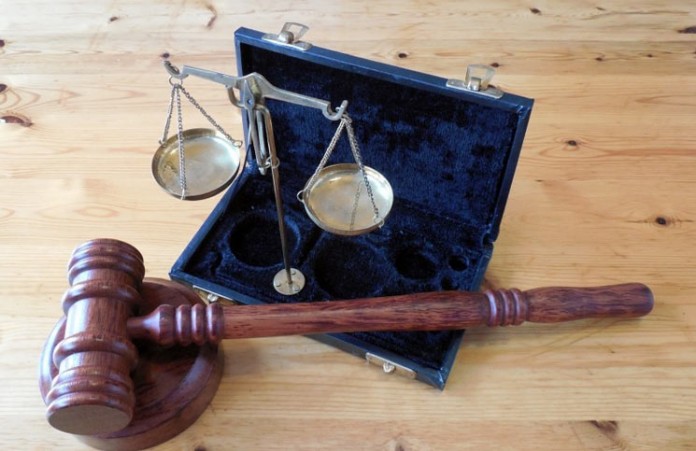In this blog post, Shabad Sandhu, a student pursuing BA LLB at Rayat and Bahra University School Of Law, Mohali, critically analyses the Law of Injunction in India and its various entities.
History of the Law of Injunction
India observes the origin of Law of Injunction in English Jurisprudence of Equity; it is where we inherited the present administration of law. An injunction that is an authoritative warning or order is derived from French and Latin verb ‘injungere’ which means “To Join”.[1] Like our verb injoin, injungere means “To direct or impose by authoritative order or with an urgent admonition.” The Law of Injunction as we have adopted from England was in fact adopted by English People from Roman Law, where it was known as interdict. The Injunction as a chancery remedy developed at the time of Henry. It is pertinent to note the historical background which manifests the origin of the power of Equity. The Jurisdiction to issue Injunction is a remedy which is termed as the Strong arm of the courts which consolidates the position of Judiciary in dispensing justice between the litigant parties.
Now the Question that comes into our Mind is that what is an Injunction? As discussed above the dictionary meaning of Injunction is an authoritative warning or order, the statutory meaning of Injunctions can be analysed in various statutes such as under CrpC, CPC, and Specific Relief Act,1963 as follows:-
- Under Code of Criminal Procedure under section 133,142 and 144.
- Under Civil matters, the law relating to grant of Injunction is contained in Chapter VII of Part III of Specific Relief Act 1963 (sections 36-42).
- Under Code of Civil Procedure 1908, Order 39 Rule 125 deals with Injunctions.
It has been termed as a preventive relief which is granted at the discretion of the court by Injunction which may be temporary or perpetual. Section 37(1) of Specific Relief Act, deals with specific Injunctions which are such as are to continue until a specified time or until further orders of the court, they may be granted at any stage of the suit or proceedings and are regulated by Civil Procedure Code. For the purpose of clarity both have to be discussed separately.
Permanent Injunctions: (Sections 37(2) and 38)
Permanent Injunctions are also known as Perpetual Injunctions they can only be granted by a decree made at the hearing and upon the merits of the suit, the defendant is thereby perpetually enjoined from the assertion of a right, or from the commission of an act, which would be contrary to the rights of the Plaintiff.[2]
Section 37(2) is a general provision stating that a perpetual injunction can only be granted by a decree made at the hearing and upon merits of the case.
Suit for permanent injunction based on possession:
In this case, it was held that ordinarily, the court should not go into the question of title. However, when the parties led to evidence of title and sought a decision on the same day, the parties could not find fault with the court contending that the title of the deed is unnecessary.[3]
Circumstances for granting of perpetual injunction (section 38):
Section 38 contains the following rules for the grant of perpetual Injunction-
- Subject to the other provisions contained and referred to in Chapter VIII, Specific Relief Act,1963, a perpetual Injunction may be granted to the plaintiff to prevent the breach of an obligation existing in his favour, whether expressly or by implication.
- When any such obligation arises from contract, the court shall be guided by the rules and provisions for specific performance of Contracts, Contained in Chapter II
- When the defendant invades or threatens to invade the plaintiff’s right to, or enjoyment of property, the court may grant a perpetual injunction in following cases, namely:-
- Where the defendant is trustee of the property for the plaintiff
- Where there exists no standard for ascertaining the actual damage caused, or likely to be caused by the invasion
- Where the invasion is such, that compensation in money would not afford adequate relief
- where the injunction is necessary to prevent a multiplicity of judicial proceedings.
Section 38, the aforesaid section can be more enlightened by the following Illustrations:
- a lets certain land to B, and B contracts not to dig sand or gravel there out. A may sue for an injunction to restrain B from digging in violation of his contract.
- A trustee threatens a breach of trust. His co-trustees if any, should and the beneficial owners may sue for an injunction to prevent the breach.
- The directors of a public company are about to pay a dividend out of capital or borrowed money. Any of the shareholders may sue for an injunction to restrain them.
- The directors of a fire and life insurance company are about to engage in marine insurances. Any of the shareholders may sue for an injunction to restrain them.
- A, an executor through misconduct or insolvency is bringing the property of the deceased into danger. The court may grant an injunction to restrain him from getting in the assets.

- The owner of two adjoining houses lets one to B and afterwards lets the other to C. A and C begin to make such alterations in the house let to C as will prevent the comfortable enjoyment of the house let to B, B may sue for an injunction to restrain them from so doing.
- A, B and C are partners, the partnership being determinable at will. A threatens to do an act tending to the destruction of the partnership property. B and C may, without seeking dissolution of the partnership sue for an injunction to restrain A from doing the act.
- A, a Hindu widow in possession of her deceased husband’s property commits destruction of the property without any cause sufficient to justify in her so doing. The heir-expectant may sue for an injunction to restrain her.
When injunction can be refused (section 41):[4]
It has been noted above that section 38 mentions the circumstances when an injunction can be granted. Section 41 supplements section 38 and states the circumstances when an injunction cannot be granted and is to be refused.
According to section 41, an injunction cannot be granted in following situations:-
- To restrain any person from prosecuting a judicial proceeding pending at the institution of the suit in which the injunction is sought unless such restraint is necessary to prevent a multiplicity of proceedings.
- To restrain any person from instituting or prosecuting any proceeding in a court not subordinate to that from which the injunction is sought.
- To restrain any person from applying to any legislative body
- To restrain any person from instituting or prosecuting any proceeding in a criminal matter.
- To prevent the breach of a contract the performance of which would not be specifically enforced.
- To prevent on the ground of nuisance an act of which it is not reasonably clear that it will be a nuisance
- To prevent a continuing breach in which the plaintiff has acquiesced
- When the conduct of the plaintiff or his agents has been such as to disentitle him to the assistance of the court
- When the plaintiff has no personal interest in the matter.
Temporary Injunctions [Section 37(1)]
Temporary Injunctions are such as are to continue until a specified time or until the further order of the court and they may be granted at any stage of a suit and are regulated by the code of civil procedure, 1908[5]
Temporary injunctions are to continue temporarily either until a specified time or until further order of the court. It is only provisional in nature and does not conclude a right or finally settle the matter. For instance, these may be an order to preserve the property until the final hearing of the case. The object may be to maintain status quo so that the alleged harm is avoided which could otherwise occur until the case is finally disposed of by the court on merits.[6]
To obtain temporary injunction the plaintiff has to prove that there is a prima facie case in his favour indicating the existence of a legal right asserted by him.[7] It has to be shown by him that the balance of convenience is in his favour so that mischief likely to be caused by the act of the defendant is prevented[8]
Order 39, Rule 1 Code Of Civil Procedure, 1908 contains the following provisions regarding the grant of temporary injunction.
Cases in which temporary injunction may be granted. Where in any suit it is proved by affidavit or otherwise:
- That any property in dispute in a suit is in danger of being wasted, damaged or alienated by any party to the suit, or wrongfully sold in execution of a decree
- That the defendant threatens or intends to remove or dispose of his property with a view to defrauding his creditors.
- That the defendant threatens to dispossess the plaintiff or otherwise cause injury to the plaintiff in relation to any property in dispute in the suit.
The court may by order grant a temporary injunction to restrain such act or make such order for the purpose of staying and preventing the wasting, damaging, alienation, sale removal of the property or dispossession of the plaintiff or otherwise causing injury to the plaintiff in relation to any property in dispute.
Objective of Temporary Injunction[9]
Preservation of property in dispute till legal rights and conflicting claims of the parties before the courts are adjudicated. The primary objective of a Temporary injunction is to maintain and preserve the existing state of things at the time of institution of proceedings and to prevent any change until the final determination of the suit. It is a relief granted to the party to prevent it from any injury
Prohibitory Injunction (section 38)
A Prohibitory Injunction prohibits or forbids the doing of some act and is governed by section 38. Such injunction may be granted to the Plaintiff to prevent the breach of an obligation existing in his favour. For instance A, B and C are members of an Undivided Hindu Family. A cuts timber growing on the family property and threatens to destroy a part of the family house and to sell some of the family utensils. B7 C may sue for an injunction to restrain A from doing the threatened act.
Mandatory Injunction (section 39)
According to section 39 when to prevent a breach of an obligation it is necessary to compel the performance of certain acts which the court is capable of enforcing, the court may in its discretion grant an injunction to prevent the breach complained of and also to compel the performance of requisite acts. When the injunction compels doing of some act, it is a mandatory injunction, but when the direction is not to do something, the injunction is prohibitory.
Conclusion
To conclude injunction means an order of Court by which an individual is required to perform, or is restrained from performing a particular act. The courts exercise their power to issue injunctions only when necessity exists. An injunction is generally issued only in cases where irreparable injury to the rights of an individual would result. It should be apparent to the court that some act has been performed, or is threatened, that it will produce irreparable injury to the party seeking the injunction. An injury is generally considered irreparable when an award of damages cannot adequately compensate it. Loss of profits alone is insufficient to establish irreparable injury. The potential destruction of property is sufficient. Injunctive relief is not a matter of right, but its denial is within the discretion of the court.
References:
[1] Article by Justice R. R. K. Trivedi Judge, Allahabad High Court
[2] Section 37(2)
[3] Sibakathulla v Amid Ayisha Nachiar, 2000 AIHC 163 (Mad.).
[4] Specific Relief Act by R.K. Bangia
[5] Section 37(1)
[6] Ram kishun v. Jamuna Prasad, (1951) 6 D.L.R. 22 (Pat.): Ismail v. Shamser, I.L.R. 41 Cal. 436
[7] Saunder v. smith, 3 M. & C. 426
[8] Begg Dunlop Co. v Satish 23 Cal. W.N. 677: Daily Gazette v. Karachi Municipality, AIR 1930 Sind. 287
[9] Civil Procedure Code by C.K. Takwani
 Serato DJ Crack 2025Serato DJ PRO Crack
Serato DJ Crack 2025Serato DJ PRO Crack










 Allow notifications
Allow notifications


